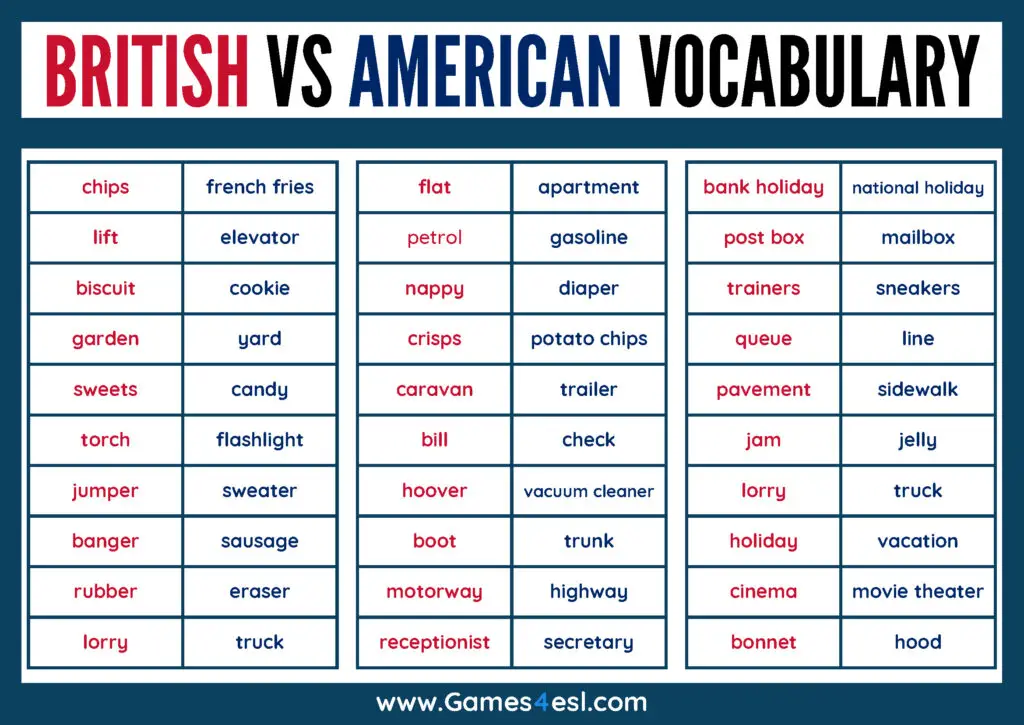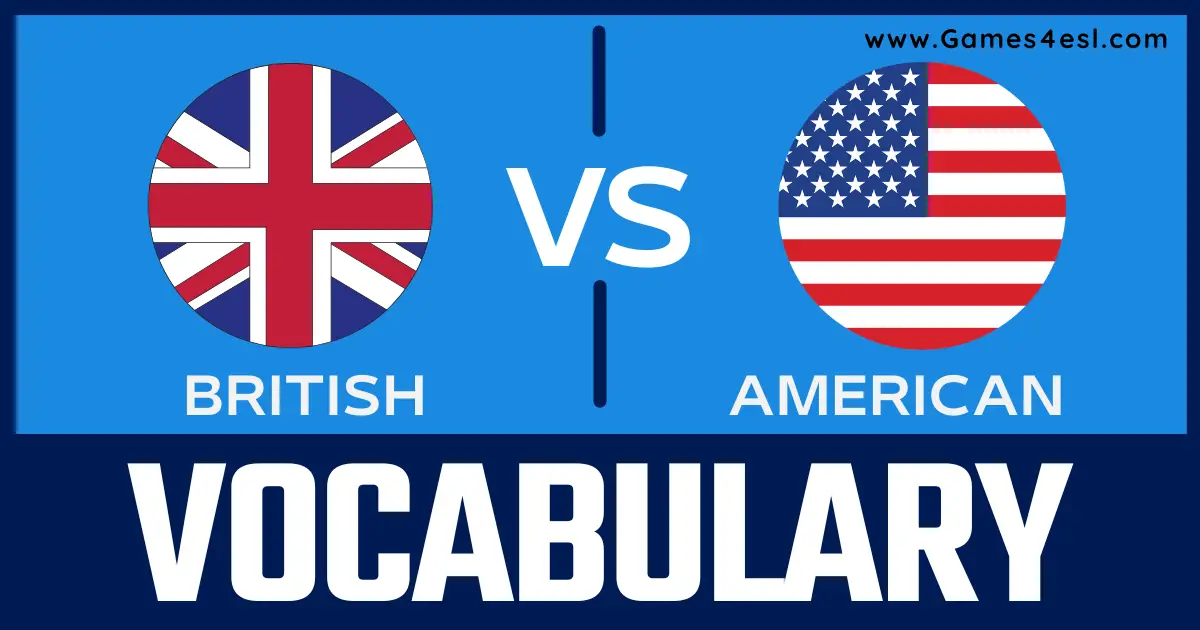British vs American English Vocabulary | List Of Words
British English and American English are two varieties of the English language that are spoken in many different parts of the world. While they share a common origin and have many similarities, they also have some significant differences in vocabulary. To help you or your students learn these differences, we have put together a useful list of words that are different in British English compared to American English. We’ll also explain some of the other differences between British And American English, such as pronunciation, spelling, and grammar.
British vs American English Vocabulary List
Here’s a list of common words that are different in British English compared to American English:
| British English | American English |
|---|---|
| chips | french fries |
| lift | elevator |
| biscuit | cookie |
| garden | yard |
| sweets | candy |
| torch | flashlight |
| jumper | sweater |
| banger | sausage |
| rubber | eraser |
| lorry | truck |
| flat | apartment |
| petrol | gasoline |
| nappy | diaper |
| crisps | potato chips |
| caravan | trailer |
| bill | check |
| hoover | vacuum cleaner |
| boot | trunk |
| motorway | highway |
| receptionist | secretary |
| bank holiday | national holiday |
| post box | mailbox |
| trainers | sneakers |
| queue | line |
| pavement | sidewalk |
| jam | jelly |
| lorry | truck |
| holiday | vacation |
| cinema | movie theater |
| bonnet | hood |
Download PDF List

Other Differences Between British And American English
British English and American English, although very similar, have many differences. The main differences between these two variations of the English language are pronunciation, spelling, grammar, and vocabulary.
Pronunciation
Here are some of the main differences in pronunciation between British and American English:
- In American English, vowels are generally pronounced more clearly and with a longer duration than in British English. For example, the ‘a’ sound is pronounced as a long ‘ah’ sound in American English, whereas it’s usually a short syllable in British English.
- The letter ‘r’ is often pronounced differently in British English compared to American English. For example, in British English, the ‘r’ sound is not pronounced in words like ‘car’, but in American English it is.
- There are differences in consonant sounds between American and British English. For instance, Americans pronounce the ending ‘-ed’ on regular verbs as either /d/ or /t/, depending on the context. Meanwhile, in British English, this ending is always pronounced as /id/.
- Intonation is often quite different in American vs British English. Americans typically have an overall flatter intonation, while British English tends to be much more varied in its patterning.
Spelling
British and American English also differ in terms of spelling. While the two languages share many words, there are some notable differences. Here are some of the main differences.
- Americans have adopted certain spelling conventions that are often seen in French and other Romance languages, while British English has kept a more traditional approach to spelling.
- Certain words have diverged spellings. For instance, Americans write ‘color’ and Britons write ‘colour’.
- Americans tend to use fewer syllables than their British counterparts when writing certain words. For example, ‘traveling’ is written as ‘travelling’ in British English.
Grammar
Grammatically speaking, British and American English differ in terms of verb conjugation and word order. Here are the main differences.
- The present perfect is used more often in British English than in American English. For example, sentences such as “I have been to London” are commonplace in British English, while Americans would typically use the simple past tense (“I went to London“) instead.
- Noun-verb agreement varies between these two varieties of English. For example, collective nouns in American English usually take a singular verb, whereas they commonly take a plural form in British English (e.g., “the team is/are playing”).
- Americans tend to put adverbs after verbs when constructing sentences, while Britons are more likely to place them before verbs. For example, in American English, you might say, “He quickly ran out the door”, while in British English, you would say, “He ran out the door quickly“.
More Vocabulary List
Thanks for reading. I hope you found this article useful. Before you go, don’t forget to check out our other English vocabulary lists for more useful resources for learning and teaching English.


